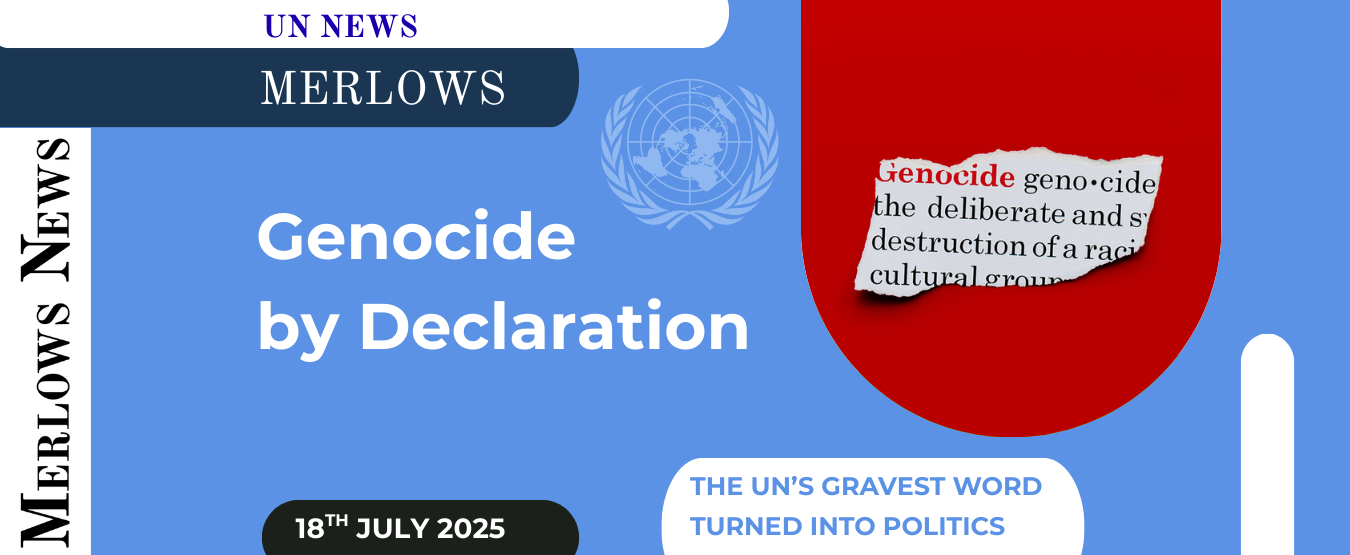Once the word described the Holocaust, Rwanda, and Darfur. Now, in the hands of a UN rapporteur, it has become a political slogan wielded against Israel.
In a Nutshell
When the United Nations coined the word “genocide” in the wake of the Second World War, it was meant to mark the most horrific of crimes. It spoke of Auschwitz and Treblinka, of the Armenians before them, of Rwanda and Bosnia later. It was not a word to be used lightly. It was the heaviest word we had.
On 15 July 2025, Francesca Albanese, the UN’s Special Rapporteur on the Palestinian territories, accused Israel of committing genocide in Gaza. Her call was dramatic: global sanctions, prosecutions, an urgent mobilisation against what she claimed was the destruction of a people. The headlines were instant. BBC declared: “UN declares Gaza genocide.” The Guardian intoned: “Evidence of genocide mounts.” CNN echoed: “Israel accused of crimes against humanity.”
The Reality on the Ground
But pause for a moment. This was not a ruling from an international court. It was not a judgment from the International Criminal Tribunal. It was one individual’s opinion—a rapporteur, not a judge. Yet the media, desperate for drama, treated it as gospel. US News reported Albanese’s claim as though it were a verdict from The Hague.
The irony is suffocating. When the very same UN is presented with evidence of famine-level starvation in Sudan—seven million people on the brink of death, according to the UN’s own humanitarian office (OCHA report)—there is no declaration of genocide. When the Rohingya are burned from their villages in Myanmar, the UN Human Rights Council offers resolutions, not headlines. When Uyghur Muslims are imprisoned in Chinese camps, the UN’s silence is as thick as the barbed wire.
History shows us how dangerous this inflation is. When Stalin starved millions in Ukraine, Western correspondents like Walter Duranty of the New York Times whitewashed it as “food shortages.” When the Khmer Rouge slaughtered Cambodians, the UN allowed Pol Pot’s regime to keep its seat in the General Assembly for more than a decade. And today, when the word genocide is deployed against Israel—a democratic state defending itself against Hamas—the word itself is cheapened beyond recognition.
Francesca Albanese (15 Jul 2025):
“What is happening in Gaza is genocide.”
Source: US News
The danger here is not just the slander against Israel. It is the corrosion of the word itself. Genocide is supposed to shock the conscience. If it can be used for every war, every conflict, every asymmetrical battle, it loses its meaning. And if everything is genocide, then nothing is.
The fantasy, of course, is that the UN will learn restraint. That rapporteurs will be chosen for impartiality, that words will be weighed with historical care, and that institutions will defend meaning rather than debase it. The reality is more bleak. The UN has become addicted to its own theatre. Words are weapons, headlines are currency, and history is no longer the foundation but the victim.
The Times of Israel noted that Albanese’s remarks aligned seamlessly with Hamas’s own rhetoric—a chilling reminder of how international institutions now mirror terrorist propaganda.
BBC Headline (16 Jul 2025):
“UN declares Gaza genocide.”
Source: BBC News
The Merlow View
The story of genocide as a word is a story of memory. Raphael Lemkin, the Polish lawyer who coined it, wanted a word to describe what had happened to the Armenians and to his own Jewish people. It was meant to stop history repeating itself. Yet here we are, watching as the word is unmoored from its history and dragged into politics.
The rational path forward is not silence but clarity. Genocide must remain a word for intent to annihilate—applied carefully, rarely, and with the gravity it deserves. Courts, not rapporteurs, should decide its use. The fantasy path is that the UN reforms itself, limiting the abuse of its gravest language. The rational path is that citizens must learn to read with scepticism, to demand evidence not slogans, and to hold institutions to their own definitions.
History is not hysterical, even if our institutions are. If genocide is to mean anything, it must remain what it always was: the deliberate destruction of a people. To dilute it for politics is to betray not Israel, but memory itself.
We cannot control the UN’s language, but we can control our own. The word genocide is too heavy to be left to theatre. See how it is used. Notice when it is abused. And remember what it once meant—because memory, not declarations, is our last defence against the corrosion of truth.







Share this: